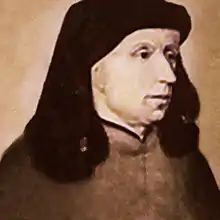Johannes Ockeghem
Johannes Ockeghem (také Jean de; příjmení Okeghem, Ogkegum, Okchem, Hocquegam, Ockegham a další varianty) (asi 1410, Saint-Ghislain, dnešní Belgie – 6. února,[1] 1497, Tours, Francie) byl nejslavnějším hudebním skladatelem franko-vlámské školy ve druhé polovině 15. století. Vedle skladatelských úspěchů byl rovněž ceněn jako zpěvák, sbormistr a učitel.
| Johannes Ockeghem | |
|---|---|
 | |
| Základní informace | |
| Narození | 1410 Saint-Ghislain |
| Úmrtí | 6. února 1497 (ve věku 86–87 let) Tours |
| Žánry | Cantus firmus |
| Povolání | hudební skladatel |
| Významná díla | Requiem |
| Některá data mohou pocházet z datové položky. | |
Dílo
Mše
- Missa sine nomine
- Missa sine nomine (neúplná, existuje jen Kyrie, Gloria a Credo)
- Missa Au travail suis
- Missa Caput
- Missa cuiusvis toni
- Missa De plus en plus
- Missa Ecce ancilla Domini
- Missa Fors seulement (dochovalo se jen Kyrie, Gloria a Credo)
- Missa L'homme armé
- Missa Ma maistresse (dochovalo se jen Kyrie a Gloria)
- Missa Mi-mi (také známa jako Missa quarti toni)
- Missa prolationum
- Missa quinti toni
- Missa pro defunctis (Rekviem)
- Credo sine nomine (část mše)
Mariánské antifony
- Alma Redemptoris mater
- Ave Maria
- Salve regina
Jiná
- Intemerata Dei mater (psáno snad r. 1487)[2]
- Ut heremita solus
Motet-chanson
- Mort tu as navré/Miserere (lamentace nad smrti Binchoisovou, psáno pravděpodobně r. 1460)
Dvouhlasý
- O rosa bella (ballata) (Ai lasso mi - Bedyngham/Dunstable?)
Tříhlasé
- Aultre Venus estes
- Au travail suis (autorem možná je Barbingant)
- Baisiés moy dont fort
- D'un autre amer
- Fors seulement contre
- Fors seulement l'attente
- Il ne m'en chault plus
- La despourveue et la bannie
- L'autre d'antan
- Les desléaux ont la saison
- Ma bouche rit
- Ma maistresse
- Prenez sur moi
- Presque transi
- Quant de vous seul
- Qu'es mi vida preguntays
- Se vostre cuer eslongne
- Tant fuz gentement resjouy
- Ung aultre l'a
Tří nebo čtyřhlasý
- J'en ay dueil
Čtyřhlasý
- S'elle m'amera/Petite camusette
Literatura
- Leeman Perkins: "Johannes Ockeghem"; Pamela Starr, "Johannes Pullois". Grove Music Online, ed. L. Macy (Accessed December 23, 2007), (subscription access)
- Heslo "Johannes Ockeghem." The New Grove Dictionary of Music and Musicians, ed. Stanley Sadie. 20 vol. London, Macmillan Publishers Ltd., 1980. (ISBN 1-56159-174-2)
- Gustave Reese, Music in the Renaissance. New York, W.W. Norton & Co., 1954. (ISBN 0-393-09530-4)
- Fabrice Fitch, Johannes Ockeghem: Masses and Models. Paris, Honoré Champion Éditeur, 1997. ISBN 2-85203-735-1
- Jeffrey Dean: "Okeghem's valediction? the meaning of 'Intemerata Dei mater'", in Johannes Ockeghem: Actes du XLe Colloque international d'études humanistes. Éditions Klincksieck, 1998. ISBN 2-252-03214-6
- Martin Picker, Johannes Ockeghem and Jacob Obrecht: A Guide to Research. (Garland Composer Resource Manuals, 13). New York: Garland Publishing Co., 1988. ISBN 0-8240-8381-4.
- Perkins, L Leeman. Music in the Age of the Renaissance. WW Norton & Co. New York. 1999.
- Brown, Howard M,. Stein, Louise K. Music in the Renaissance, 2nd ed. New Jersey:Prentice Hall, 1996. p.60-79.
- Ongaro, Giulio. Music of the Renaissance. Greenwood Press. Wesport, Connecticut. 2003. p.32.
Reference
V tomto článku byl použit překlad textu z článku Johannes Ockeghem na anglické Wikipedii.
- Brown & Stein, p61.
- Dean, p. 555.
Externí odkazy
 Obrázky, zvuky či videa k tématu Johannes Ockeghem na Wikimedia Commons
Obrázky, zvuky či videa k tématu Johannes Ockeghem na Wikimedia Commons - Biografie a diskografie
- Johannes Ockeghem Home Page
Portály: Historie | Hudba | Lidé
This article is issued from Wikipedia. The text is licensed under Creative Commons - Attribution - Sharealike. Additional terms may apply for the media files.